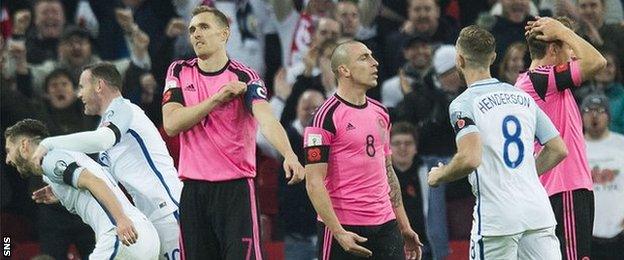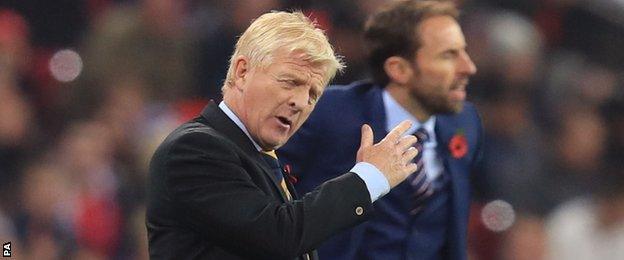England 3-0 Scotland: Gordon Strachan left licking Wembley wounds
- Published
Strachan not thinking about his future
Scotland look down on only Malta in Group F of World Cup qualifying and that stark reality means the spotlight on manager Gordon Strachan will only intensify.
After being swept aside 3-0 by England at Wembley, Scotland are facing the prospect of another qualifying failure.
While Strachan's much-changed side had threatening moments, they were wasteful in front of goal and porous at the back.
All three goals were headers by players who were poorly marked.
Daniel Sturridge's first-half goal established the home side's lead and Adam Lallana and Gary Cahill secured the result after the break.
Far from answering questions about Strachan's future and the direction of the side, the London defeat merely added a few more to the pile.
Strachan plays his hand

Adam Lallana netted the second of England's hat-trick of headers
In a game of such importance, even Strachan's starting line-up was loaded with significance.
How could it not be when the manager made as many as eight changes, with so many alterations suggesting previous selections in the campaign were flawed.
Strachan opted to pack his team with pace, which seemed a valid ploy given the speed throughout the England side.
But the decisions to play Craig Gordon, Christophe Berra and James Morrison told of a manager prepared to be radical because the consequences of dropping stalwarts like David Marshall and Russell Martin could be left for another day, or perhaps even another manager.
Strachan, in his moment of greatest scrutiny as Scotland manager, suddenly became less reserved.
He started with Leigh Griffiths, for so long the player most commonly cited when the manager's stubbornness was being questioned.
And for much of the game, there was indeed energy, resolve, and an athleticism to the Scotland performance.
There was a sense of resurgence just after the interval, too, when James Forrest ought to have equalised and Robert Snodgrass was unfortunate not to.
Scotland were certainly not as meek or listless as in Slovakia last month - and the players, it seems, continue to respond to him.
But which display will Scotland bring to their next competitive fixture against Slovenia in March next year if Strachan is still in charge - the one from Slovakia or the one from Wembley?
Despite the painful loss in London, assessing whether Strachan's time has run its course should not be a direct response to defeat to England, but rather analysed in terms of the diminishing form and authority of a side that peaked against the Republic of Ireland in November 2014.
Brown battles back
One figure - and certainly not a combative central midfielder - was unlikely to turn Scotland's fortunes around.
Even so, the sight of Scott Brown snapping into tackles, urging and marshalling his team-mates and generally bringing a restless energy to Scotland's play, will have been reassuring to Strachan.
The timing of the Celtic captain's retirement was damaging to a manager suddenly robbed of Brown's services against Lithuania and Slovakia.
But Brown's scurrying play, his spiky demeanour and his steeliness all brought at least an edge to the team's midfield.
Brown has left the length of his return open and much of his decision will have been based on the strength of his relationship with Strachan, so the manager's position will likely impact the midfielder's international future.
As he refused to be quelled by the circumstances of the game - undaunted late into the match as he clashed with Jordan Henderson - there was the conviction that Scotland remain better served by Brown remaining involved.
The Griffiths dilemma

Gordon Strachan's Wembley selection gambles did not pay off
A single performance is rarely enough to be definitive but Griffiths' display typically left room for doubt as to his value to the side.
He was, as always, a bright and sparky presence, chasing down defenders and always seeing a corridor of space to zoom off to in pursuit of an attacking opening.
The Celtic forward also ensured the England centre-backs had to be wary in the air as he challenged them with real spirit.
But when slipping a pass into the path of Snodgrass would have provided his team-mate with a clear sight of goal, he opted to shoot instead.
It was a wasteful misjudgement, characteristic of a player who is most engaged with the act of shooting and scoring.
Yet for all that Griffiths does not offer the brawn of Chris Martin or the shrewdness of Steven Fletcher, there is something encouraging about the air of menace his darting runs bring.
With Griffiths in the team, Scotland fans will feel the side carries a greater threat.
- Published4 November 2016

- Published11 November 2016
